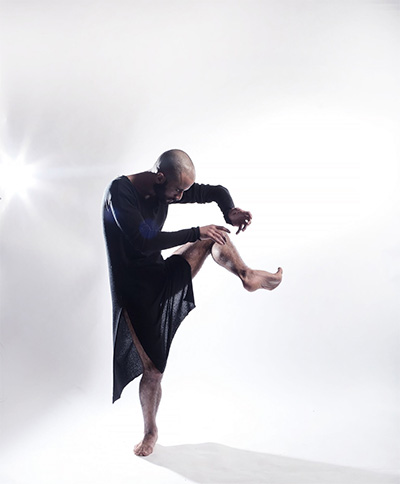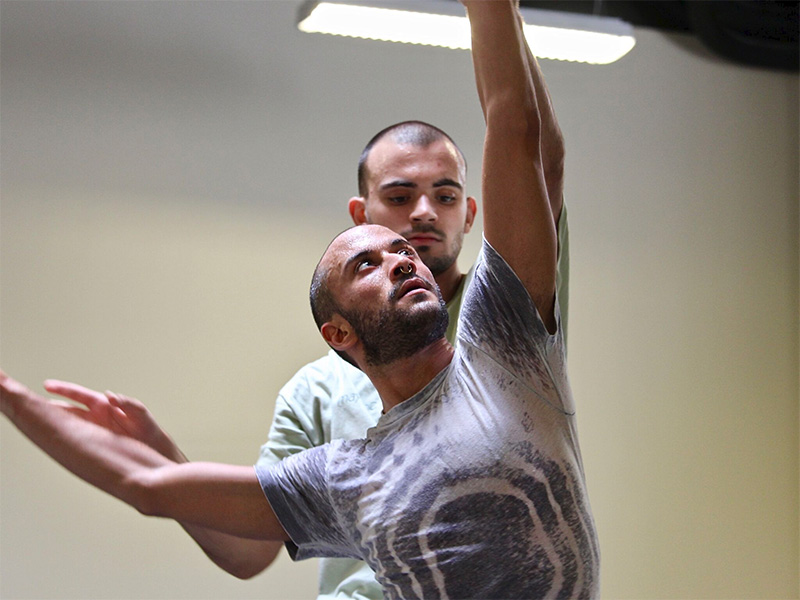Creating new work is like talking to myself; It’s me trying to understand the world I live in and the things that happen in it. I’m never sure where the work is going when I begin and I am absolutely always surprised by where it ends up. This project (whether I knew it consciously when I started or not) Aladdin, حبيبي, our re-imagined version of this iconic tale, is a love letter to my partner Chadi El-khoury, who is originating the title role in Aladdin, حبيبي. I put Chadi on the spot in this interview.
Joshua L. Peugh: What did you think when I first mentioned creating a new interpretation of the Aladdin story?
Chadi El-khoury: Being so intimately familiar with your process, it took me by surprise. I typically know about something you’re interested in for at least a year before you get to a point where you’re serious about pursing that concept or idea. Honestly, it didn’t click until we had an argument about the creation process and you asked me why I thought you were making this work. The answer was me. That was an important turning point. It seems so obvious, but I didn’t understand until that moment.

Photo courtesy of Dark Circles Contemporary Dance.
JP: Why do you think the story of Aladdin has endured and had so many interpretations?
CE: It’s a story where someone comes from nothing, but through willpower, determination, and some magic, gets everything he ever dreamed of. I think we all dream of being able to make whatever we set our mind to happen, but it’s not that simple; at times it’s impossible. The story of Aladdin gives us an opportunity to dream. We may not all wish for huge palace-sized homes, but, for me, Aladdin’s story is a reminder that through effort, commitment—and a healthy dose of stubbornness—all is possible; you just have to wish it. And, if you can’t wish it, you work to make it happen.
JP: Who is Aladdin?
CE: Aladdin is a ne’er-do-well, but I don’t relate to that part of him. For me, Aladdin is determined and resilient. He is willing to do whatever it takes to marry Princess Badroulbadour. While I think his priorities are a bit skewed, his conviction and commitment are qualities that make him special.
JP: Tell me about a challenge or struggle you’ve faced during the creation process, and how you’ve dealt with it.
CE: As a corporate Senior Data Analyst and Executive Director of Dark Circles, I feel like my brain is at capacity. Making room for an evening-length dance seems impossible. But like Aladdin, if you wish it and can will it, then it can happen.
JP: What are you personally looking for in this new interpretation?
CE: I want faces like mine to feel like they belong on stage and in this country. The U.S. is my home. I lived in Beirut for 11 years, but I’ve lived here much longer. I’ve built a life here, and you and I have built a home together. Our relationship marries our Middle Eastern and New Mexican upbringings. It has also challenged our families. The work you create and that we produce together is an extension of our life; it tells our story. Through sharing ourselves in Aladdin, حبيبي, my hope is that we help others see ways in which we are the same; I hope it encourages openness, understanding, and acceptance.
JP: What are you the most excited about?
CE: Connecting with refugee families and youth in our neighborhood and sharing a piece of my journey with them. When my family immigrated to America I didn’t speak a word of English. It was an intimidating and scary transition for us. Through Dark Circles’ community partnerships with Dallas’ refugee communities, I’ll have an opportunity to share this work with kids that look just like the 11 year-old-me who spent two years in ESL. I didn’t have Arab friends until I got to college, and I didn’t see people who looked like me on TV or on stage. To be able to look out and see little brown boys looking back at me would mean everything.
JP: In your wildest dreams, what would this production look and feel like?
CE: It would be a huge party. As kids growing up in Lebanon, we spent most Saturdays at restaurants with live bands, singers, and always belly dancers. My brothers and I would run around the restaurant while our parents were dancing dabkeh or we’d crawl under the stage trying to watch. We’d sneak under the tables when the belly dancers came out, we’d drink endless amounts of Coca-Cola, we’d play tag in the parking lot with all the other kids, and then pass out on the way home. The parties were long, but they’ll always be my favorite memories. I want Aladdin, حبيبي to be a piece of home. I want to share it with my family and give them an opportunity to experience something we rarely get to experience today.
JP: If you weren’t dancing the role of Aladdin, which role would you want to dance?
CE: Maybe Princess Badroulbadour? Maybe I’d want to dance the role of the African Magician. He’s mystical and powerful. He’s mysterious. That’s attractive to me. I want to cast a spell on the audience.
JP: What question do you still want to ask me about this new creation?
CE: You don’t make dance just to make dance; you create to express your ideas, thoughts, and to share yourself. Do you think you would have created Aladdin, حبيبي if I weren’t your partner?

